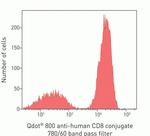Search Thermo Fisher Scientific
FIGURE: 1 / 1
CD8 Antibody (Q22157) in Flow

Product Details
Q22157
Species Reactivity
Published species
Host/Isotype
Class
Type
Clone
Immunogen
Conjugate
Excitation/Emission Max
Form
Purification
Storage buffer
Contains
Storage conditions
Shipping conditions
RRID
Target Information
Cluster of differentiation 8 (CD8), a type I transmembrane glycoprotein of the immunoglobulin family of receptors, plays an integral role in signal transduction, and T cell differentiation and activation. CD8 is predominantly expressed on T cells as a disulfide-linked heterodimer of CD8alpha and CD8beta, where it functions as a co-receptor, along with T cell receptor (TCR), for major histocompatibilty complex class I (MHC-I) molecules; whereas its counterpart, CD4, acts as a co-receptor for MHC-II molecules. CD8 exists on the cell surface, where the CD8alpha chain is essential for binding to MHC-I. CD8 is also expressed on a subset of T cells, NK cells, monocytes and dendritic cells as disulfide-linked homodimers of CD8alpha. Ligation of MHC-I/peptide complexes presented by antigen-presenting cells (APCs), triggers the recruitment of lymphocyte-specific protein tyrosine kinase (Lck), which leads to lymphokine production, motility and cytotoxic T lymphocyte (CTL) activation. Once activated, CTLs play a crucial role in the clearance of pathogens and tumor cells. Differentiation of naive CD8+ T cells into CTLs is strongly enhanced by IL-2, IL-12 and TGF-beta1.
For Research Use Only. Not for use in diagnostic procedures. Not for resale without express authorization.
How to use the Panel Builder
Watch the video to learn how to use the Invitrogen Flow Cytometry Panel Builder to build your next flow cytometry panel in 5 easy steps.
Bioinformatics
Protein Aliases: CD8 antigen, alpha polypeptide (p32); CD8 antigen, beta polypeptide 1 (p37); CD8a; CD8alpha; CD8b; CD8beta; fCD8; Leu-2; leu-2a; Leu2 T-lymphocyte antigen; OKT8 T-cell antigen; T cell co-receptor; T lymphocyte surface glycoprotein beta chain; T-cell antigen Leu2; T-cell surface glycoprotein CD8 alpha chain; T-cell surface glycoprotein CD8 beta chain; T-lymphocyte differentiation antigen T8/Leu-2; T8 T-cell antigen
Gene Aliases: CD8; CD8A; CD8B; CD8B1; LEU2; LY3; LYT3; MAL; p32; P37
UniProt ID: (Human) P01732, (Human) P10966
Entrez Gene ID: (Human) 925, (Human) 926

Performance Guarantee
If an Invitrogen™ antibody doesn't perform as described on our website or datasheet,we'll replace the product at no cost to you, or provide you with a credit for a future purchase.*
Learn more
We're here to help
Get expert recommendations for common problems or connect directly with an on staff expert for technical assistance related to applications, equipment and general product use.
Contact tech support

